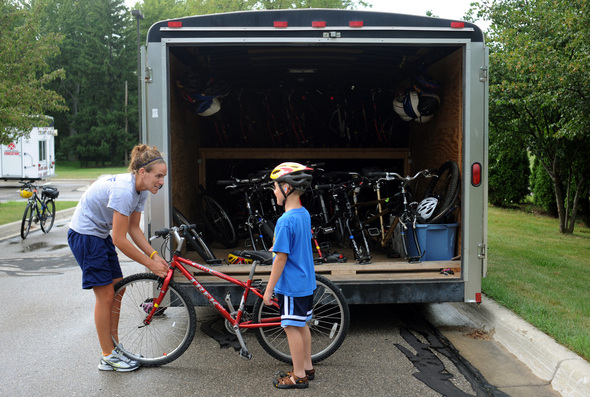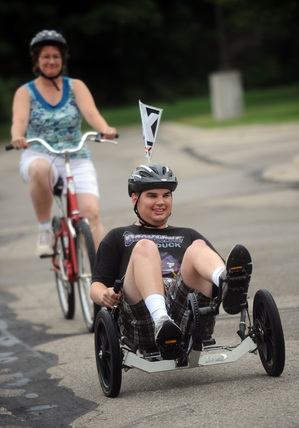Programs to Educate All Cyclists provides training for disabled youths across Michigan to safely ride a bike

PEAC site coordinator Lauren Telfer chats with Conor Waterman as she assembles a bicycle on a recent Monday evening.
Melanie Maxwell I AnnArbor.com
Katie Berger really wanted to be like her siblings and friends and ride a bike. But after a series of strokes when she was 2 years old left her with a few fine motor issues, including difficulty with balance, riding a bike was difficult for the 13-year-old Saline girl.
“When we tried putting her on a bike with training wheels, she had a very difficult time keeping her feet on the pedals and getting that motion of pedaling the bike,” said her mom, Heather Berger.
Thanks to the help of Programs to Educate All Cyclists, Katie slowly learned to ride a bike. She has attended the summer program in Saline for six years. Katie started by working on pedaling, with her feet strapped to pedals so they wouldn’t slip off. She then graduated to riding a tricycle by herself, working on steering and using the hand brakes.
Now, Katie has her own adult-sized tricycle. “She can ride independently, totally through the neighborhood. She does really well,” Berger said. She doesn’t feel like she has to watch Katie’s every move. “This gives her that freedom of being able to go fast, that speed that she needs, and being able to do it and be confident. It’s made a huge difference.”
With trained staff, specialized bike equipment, and plenty of encouragement, PEAC provides disabled individuals and their families in cities across Michigan specialized training to safely ride a bike.
This summer, Katie learned about riding safely on the street. Berger hopes she graduates to riding a two-wheel bike next summer.
At first, Berger said it was a little scary to watch Katie on a bike, but the staff made her, and her daughter, comfortable.
“I felt very at ease doing it through the PEAC program, just because you could tell they knew what they were doing, and I felt very comfortable with them taking over and helping her, and helping build her self esteem and her confidence. I think that was a big part of it, too—they have to believe that she could do it, and that made her believe she could do it as well.”

Phillip Smith rides his recumbent bike as his mother Linda follows as they ride practice laps at Saline City Hall before a group ride with PEAC.
Melanie Maxwell I AnnArbor.com
Taking small steps toward goals PEAC began as an idea in the late 1980s. John Waterman, PEAC founder, was a special education teacher in Battle Creek. A special-needs student was killed while riding a bike to school. Waterman started working with special needs students in the area.
In 2003, PEAC became an official nonprofit organization, offering lessons in the summers, special programs at schools and private lessons.
PEAC summer programs occur twice a week for seven or eight weeks in the summer, often in the parking lots of an elementary school. Families sign up for an hour time slot, during which children receive individualized training.
The trained staff pays attention to the individual needs of the students, whether they need specialized bikes or plenty of encouragement. There are 12 staff members during the summer, and three year-round.
Lauren Telfer, who has a master’s degree in special education at Eastern Michigan University, is one of the staff members.
Telfer said PEAC helps kids take small steps in moving toward their goals. Most start by riding a tricycle or by being on the back of a tandem bike led by a staff member.
Balance is usually the biggest difficulty for students, so staff members often add a back rest to a bike seat. To help the students stay on the bike, the staff can strap students to the back rest, or strap students’ feet to the pedals.
Telfer said this sounds strange, “but it works, and the kids love it.” Kids feel more secure on the bike, and are able to get used to the motion of pedaling. Telfer said the staff can also equip a tandem bike with a “kiddie crank,” which lets the kids pedal once for every two times pedaled by the captain of the tandem. This prevents the kids from getting too tired while they gradually build up their strength.
It’s all about baby steps, Telfer said, no matter the student’s goal. “We never tell them no, you’re not going to be able to do that. We don’t want to ruin their hopes and dreams. So we say OK, well first you have to do this. Let’s work on this, and then you’re one step closer.”
Gaining independence Telfer said one of the most important things PEAC does is give their students a sense of independence, “to teach them to get from home to school or home to the library, even to a friend’s house, stuff that people without disabilities just take for granted getting up and going somewhere.”
Lisa Rentschler of Saline is grateful that the PEAC program is helping her 9-year-old son Connor become more independent. Connor is autistic and has attended the summer program for four years. He has improved his balance on the bike and his ability to concentrate.
“When he first started, he’d love to watch the wheel go round,” she said. “He wouldn’t watch where he was going. But they did break him of that habit, through patience, and repeated reminders that he needed to watch the road.”
Rentschler added, “There aren’t really any other programs out there with kids with special needs to help them learn how to ride a bike and learn how to ride it safely. To have it right in our backyard is a bonus. I’m thankful that John [Waterman] has fought to keep this program funded and keep the cost low for the participants.”
Waterman said that the summer program usually costs PEAC $450 per student. Parents pay $30. The lessons often have 1-1 student-to-teacher ratio.
Finding funding for this program has been difficult. But PEAC will receive more than $800,000 in grants over the next three years. The money is part of federal transit dollars given to the Southeast Michigan Council of Governments. PEAC will use the money to help residents in Wayne, Oakland and Macomb counties walk or ride to local buses.
On Sept. 18, the PEAC is having its annual race and fundraiser, which provides most of the nonprofit’s funding. Riders can participate in a 12-, 35-, 50-, 75- or 100-mile course. Registration costs $20, and the ride starts in Hines Park in Dearborn Heights. More than 600 cyclists are expected to attend.
The race is called the “Celebration of Cycling,” because “we know everyone can ride,” Waterman said. “And [the race is] a chance to really enjoy the freedom of riding, feel the wind in your hair, and move yourself … It’s just a joy that everyone should have the chance to experience.”
Tara Cavanaugh is a freelance reporter for AnnArbor.com. Reach the news desk by e-mailing news@annarbor.com or by calling 734-623-2530.


Comments
David
Mon, Aug 23, 2010 : 9:33 a.m.
The PEAC program is a wonderful asset for those who have some physical and/or emotional concerns. I am proud to know John Waterman and several members of his staff. John also helps to organize and lead community bike rides for recreational riders. Leslee and I participate in them whenever we can, on the second Monday of the month starting at 6:30pm from the Salne City Hall.
E.A. Jacuzzi
Sun, Aug 22, 2010 : 10:56 p.m.
Agreed with Bob...Heardoc, it's obvious you didn't read the story and simply wanted to share anti-cycling sentiments on here. I am not sure how you feel like it's OK to assume every cyclist is a law breaking lunatic. The reality is the driving in Michigan is pretty much the worst I've seen in the first world, but I don't lump all people into one category because of a few texters or 65 mph left lane vigilantes. A small percentage will always be reckless and break laws no matter what type of vehicle...try to remember that. Oh, and FYI, I like to drive AND bike and feel both have a place.
Bob Krzewinski
Sun, Aug 22, 2010 : 9:57 p.m.
Good god Heardoc (and why don't you put your real name down anyway?), if ANYBODY in the whole wide world teaches people to obey traffic laws, it is the Program To Educate All Cyclists. You should go on one of their family rides sometime and just see how these cyclists, many of them of them struggling with life-long disabilites, are model traffic law bicyclists.
John Waterman
Sun, Aug 22, 2010 : 6:57 p.m.
PEAC uses the League of American Bicyclist (LAB) Education Progam for framework of our curriculm. The commuting (riding for transportation) portion of PEAC is extremely rigorous and participants have to prove skills before gaining independence. The bike may be the only mode of travel for many of our participants. Anyone who has ridden with our graduates realize their skill level and out adherrence to safe riding techniques. Unfortunately, cyclists and motorists both disobey laws to varying degrees. Education, encouragement and enforcement is the best way to improve the obedience to the law for all travels.
Marguerite
Sun, Aug 22, 2010 : 4:22 p.m.
PEAC has been great for my daughter. She has cerebral palsy and has learned to ride a 2 wheel bike. I am glad the program will continue and look forward to taking her next summer.
Heardoc
Sun, Aug 22, 2010 : 3:35 p.m.
Teach the bicyclists to obey thew laws!